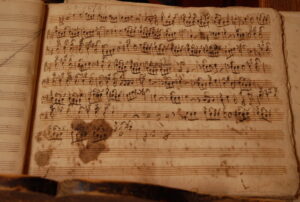Date/Time
Fri, May 10, 2024
1:30 pm EDT - 3:00 pm EDT
Presenters: Nicholas Baragwanath, Robert Gjerdingen, and Giorgio Sanguinetti
Many of the most successful teachers of foreign languages hardly ever speak in other than the language being taught. Can we do something similar in classical music? We believe the answer is “yes,” and that better, more durable results come quicker that way. In other words, we can teach a style like the 18th-century galant through that style itself, with only minimal talking, using a kind of call-and-response pedagogy.
Registration
Please register for this event (free but required) here.
Optional preparation
Participants are encouraged to try at home this partimento by Leonardo Leo, written before 1744, probably in Naples.

Presenter bios:
Nicholas Baragwanath is Professor of Music at the University of Nottingham, UK. His research focusses on European music of the eighteenth and nineteenth centuries. He regularly writes and presents for BBC Radio 3 and is the author of The Solfeggio Tradition: A Forgotten Art of Melody in the Long Eighteenth Century (Oxford, 2020).
Robert O. Gjerdingen received his doctorate from the University of Pennsylvania, where he studied under Eugene Narmour, Leonard B. Meyer, and Eugene Wolf. He has published several books on eighteenth-century music, perhaps the best known being Music in the Galant Style (Oxford, 2007). As a former editor of the journal Music Perception, his work focusses on the experiences of listeners. A subset of listeners that has garnered his recent attention comprises the orphans who attended the old conservatories of Naples, Italy and the many musical prodigies who entered the Paris Conservatory as children. In many respects their training was non-verbal. The sharp contrast between the heights attained by these children “without theory” and the sometimes dismal standards in American university music departments has led him to question the status quo. Regarding the typical theory curriculum, it may make 18th-century music harder, rather than easier, to understand.
Giorgio Sanguinetti is professor for music theory at the University of Rome-Tor Vergata. He published extensively on the history of Italian music theory, Schenkerian analysis, form, and opera analysis. In 2011 he organized the seventh Euromac conference in Rome. He has been member of the scientific committee of the Istituto Nazionale di Studi Verdiani and the Società Italiana di Musicologia. His book The Art of Partimento: History, Theory and Practice (Oxford, 2012) received in 2013 the Wallace Berry Award of the Society for Music Theory. In 2020 he published a monograph on Beethoven’s piano sonatas: Le sonate per pianoforte di Beethoven: genere, forma, espressione (Lucca, LIM). He is currently working on his new book The Craft of Partimenti: A Textbook for Oxford University Press.